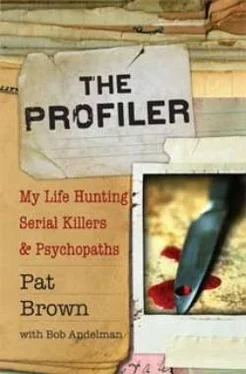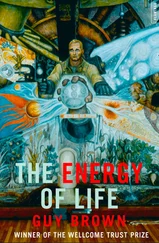Donnell said he spit on Frank on the way out of the crime scene. Yet he told the police that Frank was a nice guy who treated his mother well. Why then would he think that this nice guy got his mother killed, and why would he spit on him?
I think he despised Frank because he felt that if Frank hadn’t antagonized him, none of this would have happened, and his mother wouldn’t be dead. In other words, Frank pissed Donnell off, Donnell killed Frank, and then he killed his own mother, and it was Frank’s fault.
Donnell also said, “I’m not fixing to go to prison behind this shit.”
Say what?
If you didn’t have anything to do with it, why would you be fixing to go to prison “behind this shit”? How was that possible? Donnell may have told the police that he could handle his mother’s death, but of course if he killed her, he wouldn’t have been too happy that her death was putting him in a bad situation. He said, “I’m trying to deal with this shit, and it’s hard dealing with it when I know what the fuck went on. I panicked. I just couldn’t stop. It’s what I did. I knew I was fucking up, I knew I was fucking up. When I grabbed her, I couldn’t control myself.”
These are statements about CPR he made, but that didn’t sound like a CPR statement. It sounded like murder.
And yet Donnell was never an official or unofficial police suspect.
I DON’T BELIEVE the police ever analyzed the double homicide crime scene.
An investigator has to go in and reconstruct a crime. Find out what happened first, second, third, and fourth. Look for inconsistencies. Discern whether all the evidence matches and not make assumptions. The detective possesses some information, he thinks it’s true, and decides to move on. Some establish a theory and then ignore or don’t listen to the evidence that fails to support that theory.
The police decided that since enough people were ticked off at Donnell Washington, one of them certainly killed his mother. So when Donnell was talking, they didn’t listen. They just let a victim’s family member talk. They did the interview, and that was the end of it.
It seemed like everybody involved had some form of drug involvement and they were all squirrelly.
This was a wonderful opportunity to put Donnell away. The police did not like Donnell. They wanted Donnell off the streets. He was a problem in their community, no question about it. He was a menace.
I honestly think they decided that this was a hit on the mother because of Donnell’s drug involvement and they simply did not thoroughly analyze the evidence or what Donnell said.
It seemed to me that the evidence was almost overwhelming that Donnell was involved in this crime. I read the interviews and to me they read like a confession. But if a detective gets his mind set a certain way, he won’t notice that. He simply won’t hear it or see it.
Most of the time, the police do hard work trying to track down the people they think are involved and gather the appropriate evidence, but if we forget to stop and analyze the crime, we’ll be wasting time, because it has nothing to do with what we are looking for. We can work hard-but for no reason.
This crime did not take me tremendously long to analyze. It was a fascinating case. There were a lot of details in it, but a week was the most I needed to profile it. I gathered all the physical evidence, went through all the interviews, and right away, these things jumped out at me, starting with Donnell’s police interviews.
The police did a great job interviewing him, because they got a huge amount of information from him that demonstrated to me that he was involved in this crime.
The downside of reaching such a conclusion was that by the time I got the case, law enforcement lost a year’s time and the knife was nowhere to be found. The police may have had a surrogate confession from Donnell but not a true one. Any blood evidence that might have linked Donnell to the killings, evidence at his place of residence for example, would be long gone. I suggested that they interview the cousin and see if they could get him to talk. When I left town, the case remained unsolved.
I NEVER TOLD anybody I was coming to town to investigate the Bishop and Washington murders. That’s one of my rules. When I go in, I want to work with the police and leave.
In this case, the family must have said something to the press because I heard that a reporter contacted the police: “The family told me there was a profiler in town. Did she help you?”
They said, “No.”
By the time I came up with my profile, the police probably didn’t have enough evidence to go forward with anything, so they let it lie. There was no sense-in their view-to admit that maybe they should have analyzed this crime better a year earlier. That’s one of the reasons I feel so strongly about police training.
When my profile was done, I said, “You should be looking at this guy.”
I expected them to say something like, “We still like the drug thing, but boy, you’ve made some points… We never saw this confession thing. We better get Donnell back in here. We better get that cousin back in here and find out if he can corroborate anything that Donnell says. We need to find out why he drove off so quickly and if Donnell gave him a knife to dispose of. We better find that knife.”
Had that happened, they might have solved this crime. Instead, the case remained open. They told me they were still looking for drug connections. They were still looking for somebody other than Donnell Washington.
Sometimes, when I hear a police department say that they’re not looking at my suspect, I think, Did I really analyze this crime correctly? But there was an astounding amount of information that pointed to Donnell, and he walked away.
Here are the key elements of the profile I wrote about this case:
1. The attack occurred at Frank Bishop’s residence.
2. While Renee Washington often stayed overnight at Frank’s home, she did not do so all the time.
3. Renee’s car was not at the residence between the time Donnell picked it up (sometime around midnight) until he brought the car back at seven a.m. Unless the killer was very familiar with Renee Washington’s habits and was watching the residence, the killer would not know if she was there that night.
4. No one was permitted into the house without calling first. After ten p.m., Frank Bishop did not open the door to strangers. And sometimes not even for relatives.
5. Renee Washington was not dressed at the time she was killed. Frank was fully dressed and had his slippers on. He was in the front room. Renee was in the bedroom.
6. Frank was killed first.
7. Frank received the more violent assault in spite of the fact he fought back less than Renee.
8. Even if Donnell Washington had angered certain people, it would have been highly unusual for those people to take this kind of action. Rather than kill Washington ’s mother, it was more likely they simply would have killed Donnell. Donnell left alive would continue to be a problem. Killing his mother would make him more of a problem. Furthermore, it was not within the cultural mores of Donnell’s community to go around killing people’s mothers.
If Frank Bishop was the target of the attack, what was the motive? Frank had been involved in drug activities and there were rumors that he may have turned or was about to turn state’s evidence. However, there was no proof that anything immediate was going to happen. Frank appeared to have been well liked by family and acquaintances. No one, at that point in time, seemed to have a grudge against Frank or have made any threats. It was unlikely that any of Frank’s business dealings were the cause of retaliation.
It was also unlikely that a hit man would use the methods of killing I saw at the scene. The tossing of the table and the sudden, violent attack on Frank would seem to be born of extreme anger, not a planned killing. The attack on Renee seemed to be more of necessity than anger. None of Renee’s blood is in the living room or on Frank, but Frank’s blood is mixed with Renee’s. It would seem an argument erupted between Frank and his killer and Renee was then eliminated because she was a witness. Only one person appeared to have been involved in the killing.
Читать дальше












